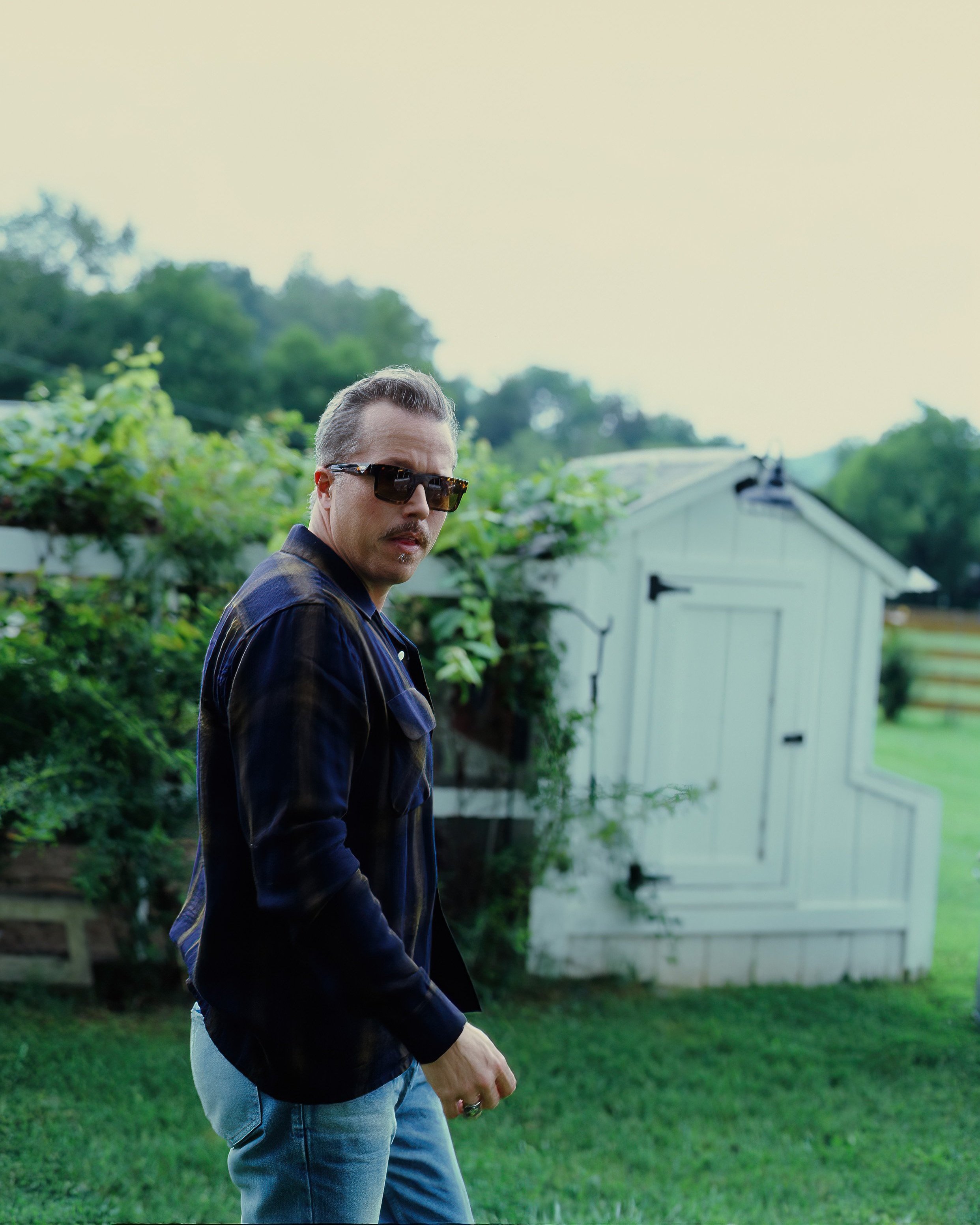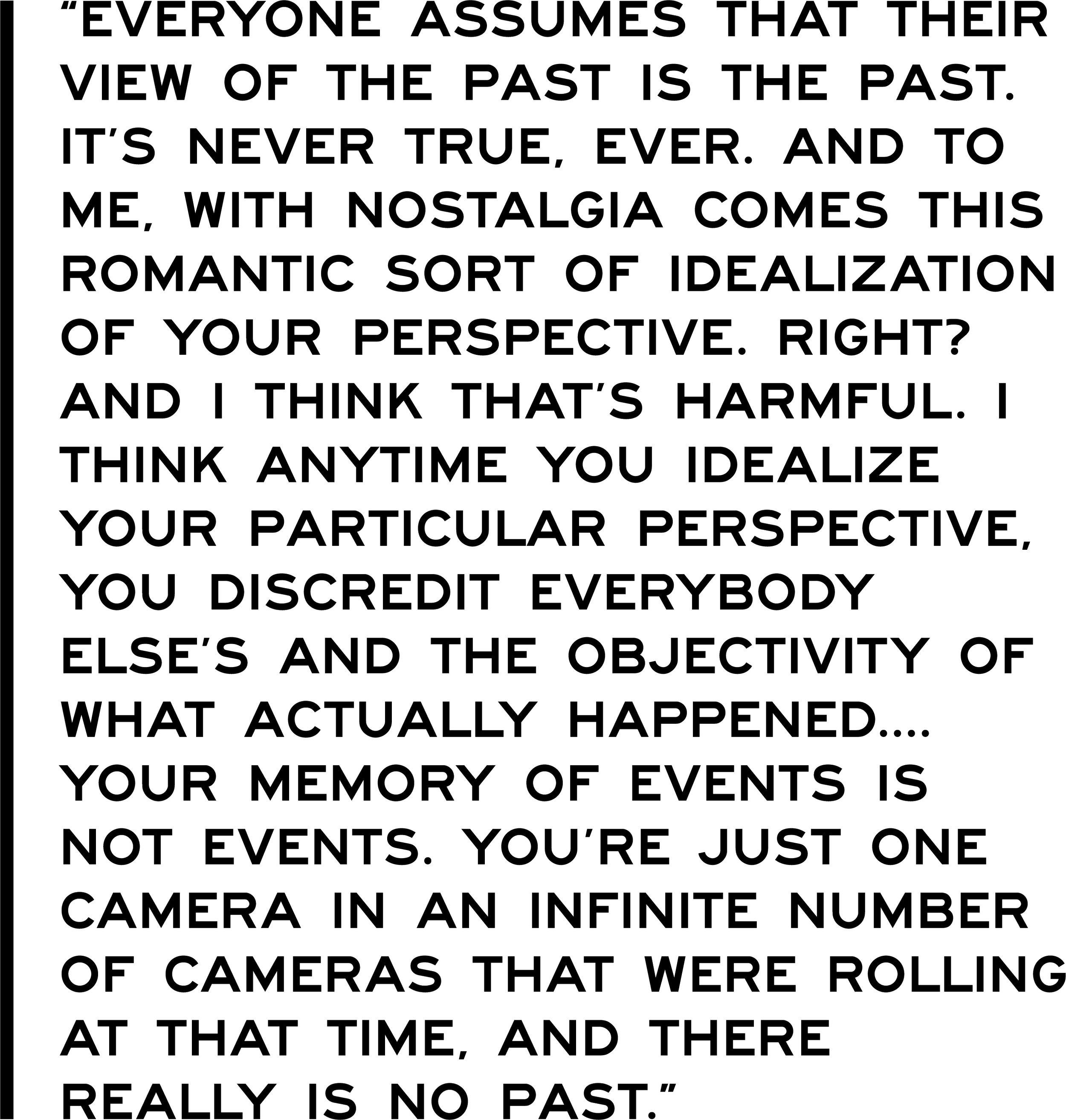A four-time Grammy winner and a novelist talk about life and empathy and writing. And the plot thickens.
Words by TAYLOR BROWN | Photos by CHRISTY BUSH
October 3, 2023
My first question for the man who may be the South’s greatest living songwriter — and in my estimation, one of its great writers, period — is not what I had intended: “Do you recognize this dog?”
We’re sitting in the black-painted barn on his farm outside Nashville — a structure whose cavernous interior recalls a rock ’n’ roll church: glowing stained-glass windows, a full stage, an art studio, and an assortment of workout equipment held in the slight disorder of a true working space. Jason is still cooling down from a photo shoot, patting the high-summer sweat from his forehead and neck, and I’m showing him a photograph of what appears to be a cross between a sheep and a polar bear.
I’ve come to town to talk to Isbell about songwriting as writing. I’m a novelist, after all, not a music critic or industry insider, and we’re living in a time when Bob Dylan has won the Nobel Prize in Literature for creating “new poetic expressions within the great American song tradition” — the first musician to receive the prize. As happens so often in life, however, a real living story has cropped up to take precedence over merely talking about stories and art.
Just minutes ago, I was rolling fast down country lanes, past sweeping green pastures and four-rail horse fencing, when I rounded a curve to find a giant, shaggy white creature standing in the middle of the blacktop. Few things would make me risk being late to talk to Jason Isbell, but a lost dog panting beneath the murderous July sun is one of them.
I stopped in the road, put on my hazards, and got out. The dog wouldn’t come to me, so I approached as near as I dared, took a couple of photos with my phone, and headed on, hoping someone at the farm would know who to call.
Isbell eyes the dog and nods. “Yes, yes. He lives around here close. He does it every day. It’s either the dog or that pig. Stephen Dorff got a 400-pound pig, and every other day the pig gets in the middle of the road, and Stephen Dorff and his wife will be out there trying to get the pig and the pig won’t move.”
I’m almost in stitches. It’s obvious Isbell doesn’t hold anything against his actor neighbor — he’s just relating the surreal scenes where country life and stardom intersect.
The words roll slowly out of Isbell’s mouth as he talks, rounded with that heavy North Alabama accent — something between a soft plains drawl and a hard hilly twang. Not surprisingly, Isbell hails from a borderland: the Shoals of Alabama, tucked between the Tennessee and Mississippi lines in the northwest corner of the state. This tri-state region was once notorious for the bootlegging and gambling operations of the State Line Mob, which clashed with folk hero Sheriff Buford Pusser of “Walking Tall” fame, and remains legendary for the “Muscle Shoals sound” that came out of its recording studios — regional mythologies that helped influence the early work of Isbell and his bandmates.
Specifically, Isbell grew up in the unincorporated community of Greenhill (not Green Hill — even Google Maps gets it wrong). It’s a place where famous actors like Stephen Dorff don’t live down the road and people might know how to handle a fifth-of-a-ton pig on the loose.
The story is the first sign of an endearing grouchiness from the man. I can’t help but smile, imagining an old, white-haired farmer perched on a nail keg in front of the feedstore. Later, the 44-year-old will tell me: “I have a lot of concerns because I’m an old dude.”
Old in rock ’n’ roll years, if not numerical ones. In 2001, at the age of 22, Isbell joined Athens, Georgia-based veterans Drive-By Truckers, a band whose work has been classified as everything from neo-Southern rock to post-cowpunk to Southern Gothic. It was a heady time for the small-town guitarist and budding songwriter. As Isbell told Men’s Journal, they were “doing something that was really magical, weird, violent, vulgar, extreme. … ”
Isbell’s early DBT cuts like “Decoration Day” and “The Day John Henry Died” mined everything from local feud legends to American folktales, breaking open old myths to find harder, more complicated truths amid the blood and cliché.
He contributed heavily to three Drive-By Truckers studio albums, writing several signature songs and becoming a core part of the band, but DBT founders Patterson Hood and Mike Cooley asked him to leave the group in 2007. While creative differences were stated as the public reason, it’s now common knowledge that Isbell’s substance abuse issues were at the heart of the break. “Ugly scenes” have been mentioned, along with “Jack Daniel’s.”
His own song “Goddamn Lonely Love” might have presaged where he found himself: “I got green and I got blues / And every day there’s a little less difference between the two.”
What followed is well-documented: several years of solo work and heavy drinking; followed by rehab, sobriety, and marriage to Amanda Shires — an acclaimed singer-songwriter, fiddle player, and founding member of the supergroup The Highwomen; and the 2013 album Southeastern, which quarried his romance and recovery for absolutely heartrending material, catapulting him into a soaring solo career.
The tenderness of “Cover Me Up” — Isbell’s love song to Shires from the album — is nothing short of devastating, revealing Isbell’s ability to capture an entire history in just a handful of lines: “Days when we raged, we flew off the page / Such damage was done / But I made it through, ’cause somebody knew / I was meant for someone.”
“Cover Me Up” won Song of the Year at the 2014 Americana Music Awards, and Isbell also took home best album and best artist that year. Three albums of Jason Isbell and the 400 Unit have all hit No. 1 on the U.S. indie charts, and Isbell has now won four Grammys: two for Best American Roots Song and two for Best Americana Album.
I discovered Isbell’s work at a formative time in my own writing life. While I’m here to delve into the creative process with him, our conversation will range far beyond this starting point, treading the edges where life and art intersect, looking for better ways of moving through the world.
In 2005, I was fresh out of the University of Georgia with an English degree and little direction beyond the first novel and short stories I’d begun to write. In what seemed like a good idea at the time, I sold my car and used the money to move to Argentina to teach English as a second language. Instead, I ended up writing web content for two cents per word, hopped up on a steady diet of double espressos and cheap cigarettes. My sweaty closet of an apartment had no internet, and I hadn’t brought any CDs in my single-suitcase move. However, I soon discovered that a couple of Drive-By Truckers tracks had come preloaded on my Dell laptop.
It seems strange even now. This wild, grunge-glorious Southern indie rock band full of black humor, progressive politics, and guitar thunder, featured on every new Dell computer?
“Oh, yeah,” Isbell tells me, “that was a big deal for us at the time. I believe it was ‘My Sweet Annette’ and ‘Decoration Day.’”
The latter track calls up a true-life feud between the Hills and Lawsons of northwest Alabama. Isbell is distantly related to Holland Hill, patriarch of the Hill clan, but he tells the story through the voice of a young Lawson, whose father is killed. There’s a hard, paradoxical complexity in the stony roll of the final lines, as this Lawson admits how he, too, would have killed his old man if he were on the other side, and let that old stone of violence keep rolling, crushing his family line.
It’s Decoration Day
And I’ve a mind to go spit on his grave
If I was a Hill, I’d have put him away
And I’d fight till the last Lawson’s last living day
I’d fight till the last Lawson’s last living day
I’d fight till the last Lawson’s last living day
I sensed a dark and powerful reversal at work in the song — an idea, perhaps, that to hate another is to hate yourself, and vengeance a snake that consumes itself. It’s something you feel in your gut more than comprehend, which gives the song that much more power.
I went to internet cafes to download every DBT song I could. Here was a band doing what I aimed to do with my writing: Take the old Southern stereotypes, light sticks of dynamite underneath them, and see what truth or beauty or horror might be found amid the dust and wreckage — usually an unforgettable constellation of all three.
To this day, Isbell’s “Outfit” — another cut from the Decoration Day album — is the most likely of any track anywhere to bring tears to my eyes. In the song, a father advises his son not to make the same mistakes he made. “You wanna grow up to paint houses like me / A trailer in my yard till you’re 23 / You wanna feel old after 42 years / Keep dropping the hammer and grinding the gears.”
In high school, I actually drove the same car from the song, a 1973 Mustang Mach 1 father-son project. What are the chances? Since the passing of my father, the song’s grip on my heart has only redoubled — it’s as if my old man is speaking to me.
I’m certainly not the only one sensing the power of these songs. As the late David Crosby told The New York Times in 2020: “Jason has become one of the best writers in the country, and my idea of really good writers is Paul Simon, Joni Mitchell, Bob Dylan. His singing is emotional. It’s honest. He’s really trying to tell you the story.”
Lest you believe Isbell was an overnight songwriting success — one whose early work came to him fully formed, as if Christ or Robert Johnson’s Devil whispered the words straight into his ear — Isbell is quick to dispel the idea. Art is work, and the rewards were cumulative for him, not instant. He was 12 or 13 when he began writing lyrics and songs that “hardly anybody” ever heard. “That was huge,” he says. “That decade was probably the most important time in my creative life.”
I’m especially moved by grainy home videos of Isbell as a baby-faced adolescent, a self-proclaimed “weird kid” shredding his Stratocaster in his bedroom for hours on end — a way to drown out his parents’ fighting. As Isbell told interviewers in a recent Music Box documentary: “The house was small, and the walls were thin, and the amp was loud.”
It seems many artists are born from some such forge, and a recent study of professional performers showed that artists can transform that pain into creativity. I have my own story around the same age — summers spent all but housebound due to surgeries, with little to do but read, read, and read. And dream. It was hell, but it helped make me who I am, and I’ve found that many writers have some similar origin story.
The same might even be said of Isbell’s 2007 break with the Drive-By Truckers. “It was heartbreaking,” he told The New York Times Magazine in 2013. “I couldn’t picture what I was going to do. But now I can’t picture things having gone differently.”
Isbell’s solo sound is much cleaner and more polished, as if time has only sharpened his knife. These are cuts that can skin the bark from your heart and drop you to your knees in four minutes flat. Isbell himself is leaner and meaner, too, like a man who’s survived a title bout with life, which he has. When I first saw him live after his recovery, I was struck by how much he resembled the Man in Black onstage — a far cry from the sweaty, back-of-the-van glory of the early DBT days.
In person, Isbell isn’t as imposing. But he is a big man, and he seems to move one gear lower than the world around him, both measured and fluent, seemingly at ease with himself and what he has to say.
When I ask if the shadow of his former self still haunts him, his voice grows higher, almost gentle, as if letting a new presence into the room. “Not really. Not now. I mean, I’ve come to terms with it. It took a while for the first decade, I guess, that I was sober. It was really hard for me to reconnect with that, or have any sort of positive memory of who I was. Right? Because I needed to stay away from that. I needed to believe that it was a dangerous person, a dangerous time. … ”
“It sounds like you almost had to have it be a black-and-white type thing.”
“It had to be,” says Isbell, pausing for a moment. “And there is a vulnerability in understanding that nuance, right? That I couldn’t afford at the time. I had to think: I was terrible, I’m not going to go back to being that. After a while, I can think: I wasn’t completely terrible. I think maybe I could see it in a way that’s not so harsh.”
We shouldn’t underestimate what a big step this must be for a man who’s careful not to romanticize the past. As he says in the promotional material for his newest record, Weathervanes: “I think nostalgia is an abomination. I think it is a crime. I think it’s unnatural.”
This is a bold statement, and one that seems to press up hard against one of the overarching narratives of our era, the rallying cry to “Make [Blank] Great Again.” America foremost, but the idea seems to have trickled into the fissures and cracks of the culture itself. The notion that everything has gone to hell in a flaming handbasket and if we could just get back to some fantastical state of historical greatness, everything would be OK.
I ask Isbell to explain, and soon we’re diving into grayer territory — a land where I feel much more at home than the realm of broadcloth American mythmaking.
“Everyone assumes that their view of the past is the past. It’s never true, ever. I think anytime you idealize your particular perspective, you discredit everybody else’s and the objectivity of what actually happened. Your memory of events is not events. You’re just one camera in an infinite number of cameras that were rolling at that time, and there really is no past.”
The old Faulkner axiom comes to mind: “The past is never dead. It’s not even past.” History and identity are narratives we are writing and rewriting all the time, as individuals, cultures, nations, even as a species — perhaps now more than ever. There’s a great deal of freedom and power in that fluidity, but it also rubs up against institutions, power structures, and narratives resistant to change.
I think of the rocky shoals of Isbell’s home territory, where they rise jagged from the Tennessee River just upstream of the Wilson Dam. Some say the legendary “Muscle Shoals sound” comes from the mud, some say the blood, some say the roaring of the river against the stone. Others say it was the rub of Black and white musicians working together, especially during the fraught 1960s.
It takes a village to raise an artist — and what a village this was. After studying English and creative writing at Memphis State, Isbell landed a songwriting job at FAME Studios in Muscle Shoals, working beneath the tutelage of the late legend Rick Hall — a publishing deal he would keep all the way up through the release of Southeastern.
For the uninitiated, FAME (Florence Alabama Music Enterprises) became an unlikely hotbed of recording in the 1960s and early ’70s, where Hall cut tracks with Aretha Franklin, Wilson Pickett, Etta James, Otis Redding, and many more — heady environs indeed, located just 20 miles from Isbell’s hometown of Greenhill. Muscle Shoals Sound Studio, meanwhile, recorded the likes of the Rolling Stones, Paul Simon, Bob Dylan — the list goes on. At one time, Muscle Shoals was “The Hit Recording Capital of the World.”
When I drive down to Muscle Shoals after our conversation, I’ll pass signposts from Isbell’s early work. I’ll drive past the Lawson’s outdoor store (remember that name?), stop at the state-line beer joint Parker’s Place (“My brother got picked up at Parker’s / Got him a ride in a new Crown Vic”), and cross the Wilson Dam (“You can throw me off the Wilson Dam / But there ain’t much difference in the man I wanna be / And the man that I really am”).
When I visit FAME, the studio assistants will show me the Wurlitzer where Aretha’s first hit was born, the spot where Gregg Allman would sleep between sessions, and the original handwritten notebook pages of Isbell’s “Decoration Day” and “Outfit,” which are displayed in a place of pride, framed and hung just beside the main office door. FAME’s studio assistant Wes Stricklin tells me that Isbell was one of the last songwriters that “Mr. Rick” really took under his wing, and that Isbell also worked among writers like Walt Aldridge, Brad Crisler, and James LeBlanc, who were writing “monster songs.”
Somewhere along the way, Isbell learned to wield the sharp edges of memory with tremendous power — images that stand out starkly from that ever-changing river of the past, like bright fragments in a dream.
“Dreamsicle,” from his 2020 album Reunions, is one such case, flickering with images of “mama’s red hair” and “broken glass,” “heat lightning” and “a dreamsicle … in a folding lawn chair.” It’s a song inspired by his parents’ separation, tender and devastating enough to make your heart ooze hot and sticky through your veins.
Back in the barn, I ask Isbell what the songwriting process is like for him. Does it start with an image of a popsicle or broken glass? Or a melody, even a theme? These are questions often asked of writers and poets, and I’ve found an artist’s process is often a keyhole into their deeper interior world.
Isbell pauses to consider the question, drawing on his vape and letting the smoke cloud his face. “It’s kind of like, what’s your process for making dinner?” He says it could be something he sees or overhears, or sometimes he’s playing an instrument and gets an idea musically — anything really. “Eventually you realize that any way to get there is the right way to get there. It’s just like any writing at all, except, eventually, you’re going to have to make it fit into the boxes that it needs to fit in for you to be able to sing it. That’s really the only difference.”
Isbell has cited Bob Dylan as a major influence — he even has a quote from “Boots of Spanish Leather” tattooed on the inside of one forearm — but he’s sure to point out that his approach is very different from Dylan’s. He aims to avoid “songwriterly” language, preferring to “tell it to them straight.”
“My primary focus now is trying to write things that sound like they could be overheard. Common language with uncommon messages.”
“Cast Iron Skillet” might be the clearest, most recent example of this approach, striking old myths and stereotypes with the sharp hammer of creative pressure until they crack. Common adages like “Don’t wash the cast iron skillet” are scrubbed against something far deeper and darker, as the speaker laments the strands of venom running beneath daily life, the hate we allow to poison what ought to be “simple as a weathervane.”
Jamie found a boyfriend
with smiling eyes and dark skin
And her daddy never spoke
another word to her again
[...]
Don’t wash the cast iron
skillet
This town won’t get no
better, will it?
She found love and it was
simple as a weathervane
But her own family tried to
kill it
There’s something at work here beyond the words on the page. You really have to hear Isbell’s delivery, the whole trains of hurt and love and loss freighted in his voice. I can’t help but wonder if it goes back to the Shoals and the celebrated sound that came out of there — a blend of R&B, gospel, blues, and country.
Some people call it soul music, but Isbell says we shouldn’t. “I mentioned soul music to Bettye LaVette one time. She said, ‘Honey, everything I do is soul. The music I make is rhythm and blues.’” Isbell bows in the chair across from me, as if Bettye is standing before us. “OK, duly noted, ma’am. I’ll never call it that again.”
Isbell says he didn’t really understand what made the music so powerful until he was in his 20s. Once he came to understand what went into the creation of R&B, the “generations of pain” behind voices like Aretha Franklin and Otis Redding, the music became “very sacred” to him.
“I believe that particular era of rhythm and blues music is the greatest American art has ever gotten in any format, any medium,” he says. “I think that’s the thing that we have offered the world that has been the most valuable. It all came out of struggle, it all came out of people being treated less than human. But you can hear it … that pain … it’s almost like something subliminal in the music that you’re listening to that makes it go straight to your heart.”
Though he might not say it, I believe some of that muddy Muscle Shoals magic must have trickled into Isbell’s own voice and lungs and heart. It’s the only way to explain the power of the songs, something that goes beyond the words and notes, so that you know the man has been to hell and back, and returned with something rare and beautiful for the rest of us.
As people grow older, it seems they either grow harder and more set in their ways, or more sensitive and open. Isbell says it’s the latter for him.
“I cry all the time.”
Although writing has gotten harder (“I won’t accept the things I used to”), he believes the enhanced sensitivity has made him a better artist.
“If you see a person on the street, and it doesn’t make you feel anything — you’re not sad, you’re not empathetic, you don’t feel pity or anything else for that person — then you’re not going to think about it for very much longer. But if you lay there and worry on things that you’ve seen all day, then you might get back up,” says Isbell. “It’s not great for sleeping, but it’s good for songwriting.”
Isbell emphasizes the ideas don’t just come to him. “I see it as a gigantic field full of little stones, and it’s under one of them, and it might be the first one I pick up, and it might be the 4,000th one I pick up, but I got to keep picking them up until I find it, because I know it’s under one of them.”
A workman, then. But one always looking for new stones, different paths. Always searching, as if that were the very job description. And perhaps it is.
“I feel like the people who I respect the most are the people who just accept and announce that ‘I am a searcher. I don’t have the answers. I’m going to continue to look for them.’”
We talk about how that search can be a way of life, not just an artistic pursuit, and here things begin to get really interesting, as the wall between the man and the art grows razor thin. Isbell tells me he’s largely trying to document where he is in life, the challenges he’s trying to overcome.
I’m curious about some of the recurring themes in his work, faces that seem to rise up again and again like stones in a stream. It seems his characters are often grappling with what it means to be a man, or the kind of man their world has taught them they should be.
In 2011’s “Alabama Pines,” he sings: “I tried to be some ancient kind of man / One that’s never seen the beauty in the world.” Six years later, in “Hope the High Road,” it’s: “I used to want to be a real man / I don’t know what that even means.” And in “Middle of the Morning,” a track off this year’s album, he says: “I ain’t used to this, seein’ everybody’s hand / I was raised to be a strong and silent Southern man.”
Isbell nods solemnly as I throw out these snatches of lyrics. Soon the concept of vulnerability turns up again. “Giving other people the ability to harm you is, I think, paramount in developing as an adult. And that is really difficult to do. A lot of male cultures, especially the Southern American male culture – we’ve not been very good at that for a whole lot of reasons.”
We talk about those reasons. Some systemic, some cultural. Some positive, some negative. We discuss the idea that men didn’t always feel they could open themselves up to emotional risk, but we’re getting to a point where that isn’t necessarily “one of the rules” any longer.
I sense we’re verging on something powerful here, a territory I hoped we might explore before I ever stepped foot in this barn. It’s something I think about a lot, and not just as it pertains to masculinity or gender. So often, it seems that hardness and inflexibility, even stubbornness, are perceived as strengths, when it actually takes more guts, more faith, and more courage to be vulnerable, open, and empathetic. It’s an idea that goes beyond the music or art, pushing into new ways of being.
“To change and meet the moment,” says Isbell, “I think letting go of some of that armor and figuring out who you can trust and how is an important part of the process. And it is for me. So that’s what I’m documenting when I’m writing these songs.”
What I’m seeing in Isbell goes beyond the man, the writing, even the music — a vision of sensitivity as strength, and empathy as power. In a culture that seems ever more divided, I can think of no better way of moving forward.
Of course, there are dangers in making art mainly about yourself, and if you want to talk about vulnerability, you’d better be willing to walk the walk. When I ask Isbell about his own flaws, he answers readily, rattling off a laundry list that includes hubris, impatience, holding people to unrealistic standards, and then right back to vulnerability itself. “I haven’t solved the puzzle of being vulnerable and being open to people. I get better at it, but I haven’t completely solved that. I don’t know that I ever will.”
There are inconsistencies as we talk. Threads of borderline nostalgia for a childhood without the distractions and social media pressures kids face these days, and for a time when there was more money in the music industry. The latter, though surely true, is a harder pill for me to swallow. Of all the talented, successful novelists and nonfiction writers I know, very few actually make a living at the work, even those of us published at the highest levels — by the literary equivalents of Atlantic and RCA Records. But I’ve always carried too many sins myself to be any kind of stone-caster, and personally, I wouldn’t trust any artist without some contradictions. They wouldn’t be human, would they?
Much like Isbell’s idea of turning up stones, the importance here is that you don’t quit trying to do better. “How do we show more people how beautiful it can be to be alive? You don’t give up on it. And you don’t plan on it working, either. You just keep doing it.”
Needless to say, it takes a good deal of confidence to sustain such personal vulnerability, especially with so many eyes on you. But that double edge of confidence and vulnerability is crucial to stepping into new territory, and Isbell is doing that. He has a role in Martin Scorsese’s adaptation of Killers of the Flower Moon, playing Bill Smith, the husband of an Osage woman who’s killed during the 1920s “Reign of Terror,” when 60 or more Osage tribal members were murdered for the oil deposits beneath their land.
Because of the WGA and SAG-AFTRA strikes, Isbell can’t be quoted directly about the film, but as he told online publication Consequence back in June, “I was terrified,” especially after Robert De Niro kept giving him looks on set, thinking his accent was some kind of redneck put-on until De Niro realized it was just how Isbell talked. But Isbell worked through the fear, and his time in Oklahoma found its way into Weathervanes.
We talk about how he saw a lot of the same issues while filming out there that he sees at home in the South: the opioid crisis ravaging rural America (“That’s not the drug war that we’re focused on fighting, which is really strange to me”), racism (he and his daughter, Mercy, were invited for dinner at the home of a Chinese couple who’d come to the States as oil company engineers and “some people were very unkind to them” during the pandemic), and the rise of fundamentalism (“Things can get worse, and they probably will”).
Isbell doesn’t like to think of what’s going on in our country as a culture war, but he does think fear is at the root of it, and that artists have a role as much as anyone else.
“If you look out the window and you see something happening that is not fair, you have to say something about that, period. It doesn’t matter if you make music for a living or bag groceries for a living. The spotlight gets put on people who have a larger audience, but it’s everybody’s responsibility.” Certainly, there are populations for whom it isn’t always safe to stand up or speak out, but I believe Isbell means those who can, should.
I ask whether he feels a pull to return to points farther west in his work, but the South keeps calling him home — not in spite of its flaws and contradictions, but because of them. “I feel like I’m needed in a place like this. And also that rub is important to the work that I do. Right? The songs, the vitriol and the bile and the anger without bitterness. The anger in it is important for me. It fuels me creatively. … ”
That anger, however, doesn’t overshadow his love of the South. “There are so many beautiful things. But not everybody gets to experience them in the same way and as often. And that’s the point.” As he told Stephen Deusner, music critic and author of Where the Devil Don’t Stay: Traveling the South With the Drive-By Truckers, it’s “possible to be bitter about where you came from and still love the place.”
Call it what you like, there’s an edge to this man, as if he’s trying to cut a path into a better world. For himself, for his wife, for his daughter. For all of us. And I believe he is.
He’s gunning for the old rock star stereotypes at the same time, swinging the same myth-breaking hammer that he does in his songs. He doesn’t want to be another stereotypical old rocker shuffling around Nashville with “kids that won’t call you back” and “12 ex-wives” — the kind of fallen star who leaves a swath of human wreckage in his wake, only to end up “dying alone.”
“I think part of what I’m trying to do in an overall sense is disprove a lot of those clichés. It’s possible, I think, to show people that you can take care of yourself and take care of your mind and take care of the people that you love and still fucking rock.”
In our talk, my mind keeps jumping to the same place again and again — an instinct I’ve learned to trust above anything else in what I do. I keep thinking of Sheriff Buford Pusser of McNairy County, Tennessee, not 50 miles from Isbell’s hometown. A figure of lore in the land, a 6-foot-6 lawman and former semi-professional wrestler who waged a one-man war of vengeance against the Dixie Mafia. In the process, Pusser appointed one of the first Black deputies in the state, his wife was murdered, his jaw was blown off, he survived seven assassination attempts, and his story was immortalized in the “Walking Tall” films.
It’s hard to overstate Pusser’s influence on Southern culture. Released in 1973, “Walking Tall” helped kick off a slew of “hicksploitation” films and television shows like “The Dukes of Hazzard” that would propagate Southern stereotypes for generations, and “Walking Tall” grew into seven films and a TV series, including a 2004 remake with Dwayne “The Rock” Johnson in the lead role. The Drive-By Truckers devoted a trilogy of songs to Pusser on their 2004 album The Dirty South, which deconstructed the hero myth to show a much more complicated figure, and modern observers have shed serious doubts on the man’s methods and legacy.
Pusser might be the epitome of the old way: the strong, silent, Southern type who spoke most often with the whistling end of a 2-by-4. The Buford stick. And his shadow was incredibly long, looming over the South for decades.
Isbell is a new kind of Southern man — one who wields a guitar instead of a 2-by-4 and two huge lungs instead of fists. The big man from Alabama is evidence that six strings and a voice are mightier weapons than any old stick, and sensitivity the better part of strength. Isbell is teaching us that it might be harder to feel than not, but it’s worth it. It’s what we need as artists, as humans, as a culture. Isbell is a new way of walking tall, and we should all stand up and listen.
Styling by Heathermary Jackson and Grooming by Robin Geary
Taylor Brown is the author of the short story collection In the Season of Blood & Gold, as well as the novels Fallen Land, The River of Kings , Gods of Howl Mountain, Pride of Eden, Wingwalkers, and the forthcoming Rednecks. You can find his work in The New York Times, The Wall Street Journal, Garden & Gun, and many other publications. He’s a recipient of the Montana Prize in Fiction, a three-time finalist for the Southern Book Prize, and was named the 2021 Georgia Author of the Year for Literary Fiction. He lives in Savannah and serves as editor-in-chief of BikeBound.com, a custom motorcycle publication.
Christy Bush is a fine art and fashion photographer living in Athens, Georgia. She is known for her whimsical, intimate, and joyful approach to her subjects. Her work has been shown in New York, Paris, Japan, and Atlanta. Recent publications include Fat Magazine (Denmark), Lovewant (Australia), and Index (New Zealand). Christy’s photography book, Familiar, was published by BS Publishing in 2022, and she is represented by Jackson Fine Art.
More from The Bitter Southerner





















